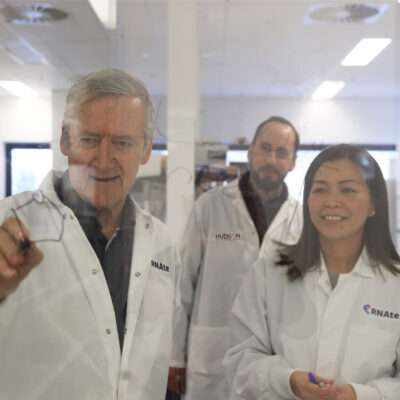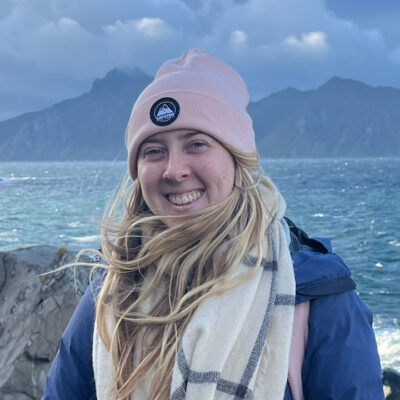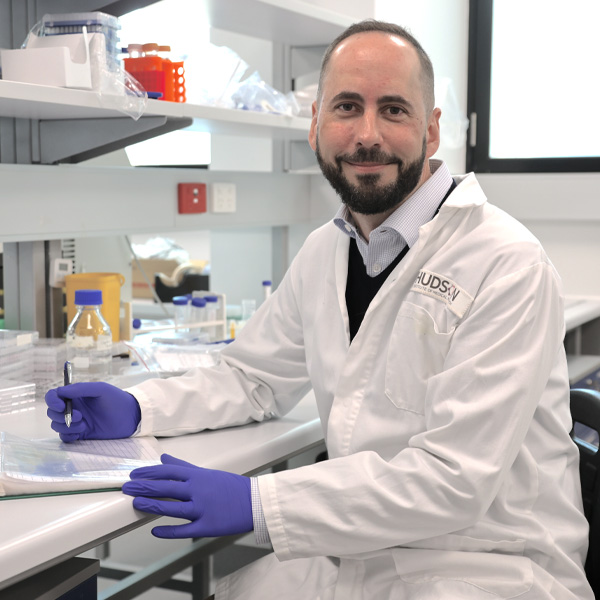Cancer drug investigated as anti-inflammatory for lethal conditions including COVID-19
By Hudson Institute communications
An existing cancer drug could potentially modify a severe hyper-inflammatory ‘storm’ associated with some conditions, which may include the COVID-19 virus, according to Hudson Institute researchers.
The researchers joined forces with cancer drug developer, Noxopharm, and discovered that the oncology company’s prostate cancer medication idronoxil could block the production of several pro-inflammatory proteins, known as cytokines. These proteins are believed to be involved in a ‘cytokine storm’, which causes a severe inflammatory response believed to be responsible for most of COVID-19 deaths.
The discovery in pre-clinical cell models is an encouraging development towards human clinical trials as a potential COVID-19 treatment.
Hudson Institute researcher Dr Michael Gantier, Research Group Head of the Nucleic Acids and Innate Immunity Laboratory, identified the previously unknown functions of idronoxil in blocking the cytokines, in his laboratory research.
“Our laboratory studies indicate that idronoxil inhibits inflammatory cytokines produced in the context of tissue damage seen in acute respiratory distress syndrome (ARDS),” Dr Gantier said.
“Unlike strategies selectively targeting specific cytokines, our findings suggest that idronoxil blocks the process of inflammatory cytokine production, along with other key influencers of organ failure,” he said.
“Our continued work is focused on linking what idronoxil does in cell models, and what actually happens in critical COVID-19 patients.”
How does COVID-19 cause deaths?
The danger with COVID-19 infection lies in its progression from a mild disease, into an overwhelming and lethal later-stage condition following a severe inflammatory response from the body’s immune system. This can lead to ARDS, respiratory, heart and kidney failure, blood clotting problems and septic shock.
The triggers of the severe hyper-inflammatory response in some COVID-19 patients is not fully understood. However, it is known to be associated with a ‘cytokine storm’. Normally, several proteins known as pro-inflammatory cytokines help to regulate a healthy inflammatory process in the body to protect against infection or illness. However, in a ‘cytokine storm’, their levels are excessively high in the blood. One key cytokine known to be a primary driver of the process is interleukin-6 (IL-6).
Next steps
In an announcement to the Australia Stock Exchange (ASX) on Wednesday, 1 April 2020, Noxopharm said it was investigating funding sources for a clinical study to evaluate the use of idronoxil in patients at risk of developing COVID-19 associated ARDS and multi-organ failure.
In addition, a provisional patent concerning idronoxil and mechanisms of action relevant to the treatment of viral- and bacterial-associated hyperacute inflammatory conditions, including septic shock has been filed.
Idronoxil, the active ingredient in Noxopharm’s prostate cancer drug Veyonda, is a strong inhibitor of IL-6. Dr Gantier and his team’s findings highlight the drug’s potential to act on a wider range of proteins driving the cytokine storm.
Noxopharm chief executive Dr Graham Kelly said idronoxil would be formulated in an oral form called NOX-19 to distinguish it from Veyonda.
“The intention of the study is to see if providing NOX-19 to patients with early-stage organ damage can block the rapid development of a cytokine storm and prevent sepsis and ARDS,” he said. “The hope is that this may result in fewer patients being admitted to the ICU and a reduction in the number of patients that will need ventilators. This would greatly reduce the pressure on hospitals.”
Contact us
Hudson Institute Communications
t: + 61 3 8572 2761
e: communications@hudson.org.au
About Hudson Institute
Hudson Institute’ s research programs deliver in three areas of medical need – inflammation, cancer, women’s and newborn health. More
Hudson News
Get the inside view on discoveries and patient stories
“Thank you Hudson Institute researchers. Your work brings such hope to all women with ovarian cancer knowing that potentially women in the future won't have to go through what we have!”







